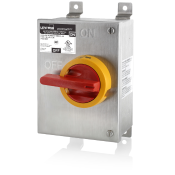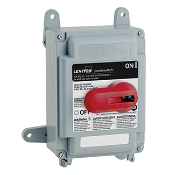445.18 Disconnecting Means and Shutdown of Prime Mover
Change Summary
- Generator disconnecting means have been reorganized. Provisions for disconnecting means, shut down of the prime mover, and provisions for generators installed in parallel have been added.
| NEC® Text |
|---|
|
445.18 Disconnecting Means
(A) Disconnecting Means. Generators other than cordand plug-connected portable shall have one or more disconnecting means. Each disconnecting means shall simultaneously open all associated ungrounded conductors. Each disconnecting means shall be lockable in the open position in accordance with 110.25. The provisions to shut down the prime mover shall be permitted to satisfy the requirements of 445.18(A) where it is capable of being locked in the open position in accordance with 110.25. Generators with greater than 15 kW rating shall be provided with an additional requirement to shut down the prime mover. This additional shutdown means shall be located outside the equipment room or generator enclosure and shall also meet the requirements of 445.18(B)(1) and (B (2). (C) Generators Installed in Parallel. Where a generator is installed in parallel with other generators, the provisions of 445.18(A) shall be capable of isolating the generator output terminals from the paralleling equipment. The disconnecting means shall not be required to be located at the generator. Copyright© 2016 National Fire Protection Association |
Expert Analysis
Generators are generally required to be equipped with an appropriate disconnecting means (445.18). Historically, Article 445 has not listed requirements for the shutdown of the prime mover for a generator. Typically, a generator is the combination of an electrical generator and an engine (prime mover) mounted together to form a single piece of equipment. This combination is called a generator set or a “gen-set.”
This lack of information and regulations for a “prime mover” is addressed for the 2017 NEC with the addition of 445.18(B), Shutdown of Prime Mover. This new requirement was added to require shutdown of the prime mover for generators and, in particular, generators rated greater than 15kW. A new sentence was also added to 445.18(B) to clarify that the general provisions to shut down the prime mover may also satisfy the requirements in 445.18(A) for a disconnecting means for the generator (or generator set) under specific conditions. This additional requirement was necessary to provide a remote shutdown means in the event of an emergency. This shutdown means for the prime mover is needed to prevent the generator set from unexpectedly starting and running while the generator is shut down for such things as undergoing service.
A new 445.18(C), Generators Installed in Parallel, clarifies that where generators are installed in parallel, it is not necessary to provide a disconnecting means at each generator and the paralleling equipment as long as the generator is capable of isolating the generator output terminals from the paralleling equipment. Arranging generators to operate in parallel is becoming usual practice for hospitals, data centers, and large buildings requiring onsite backup power. Generators installed in parallel are not exempt from requiring a disconnecting means to disconnect the control circuit, the fuel supply, and to render the generator incapable of restarting. This requirement does not remove the requirement for identified overload protection at the generator, per the requirements of 445.12(A).
Safety Disconnect Switches
Leviton offers a full line of Enclosed Safety Disconnect Switches for every application, including the PowerSwitch Enclosed Safety Disconnect Switch Product Line: DS and EDSR Series
• The DS Series of 30-Amp to 100-Amp, fused and non-fused enclosed switches
• The EDSR Series which brings a 30-Amp, non-fused safety disconnect switch and NEMA locking receptacle into the same enclosure for easier installation and maintenance
• The MDS30-AX, our 30-Amp, non-fused stainless steel enclosed disconnect switch
Heavy Duty Enclosed Safety Disconnect Switches cut power to the circuit for equipment servicing and are designed to withstand higher short circuit currents than manual motor controllers. Watertight and dust-tight, PowerSwitch Safety Disconnect Switches are the ideal choice for process environments with particulate laden air, outdoor exposure, or requiring water washdowns.











